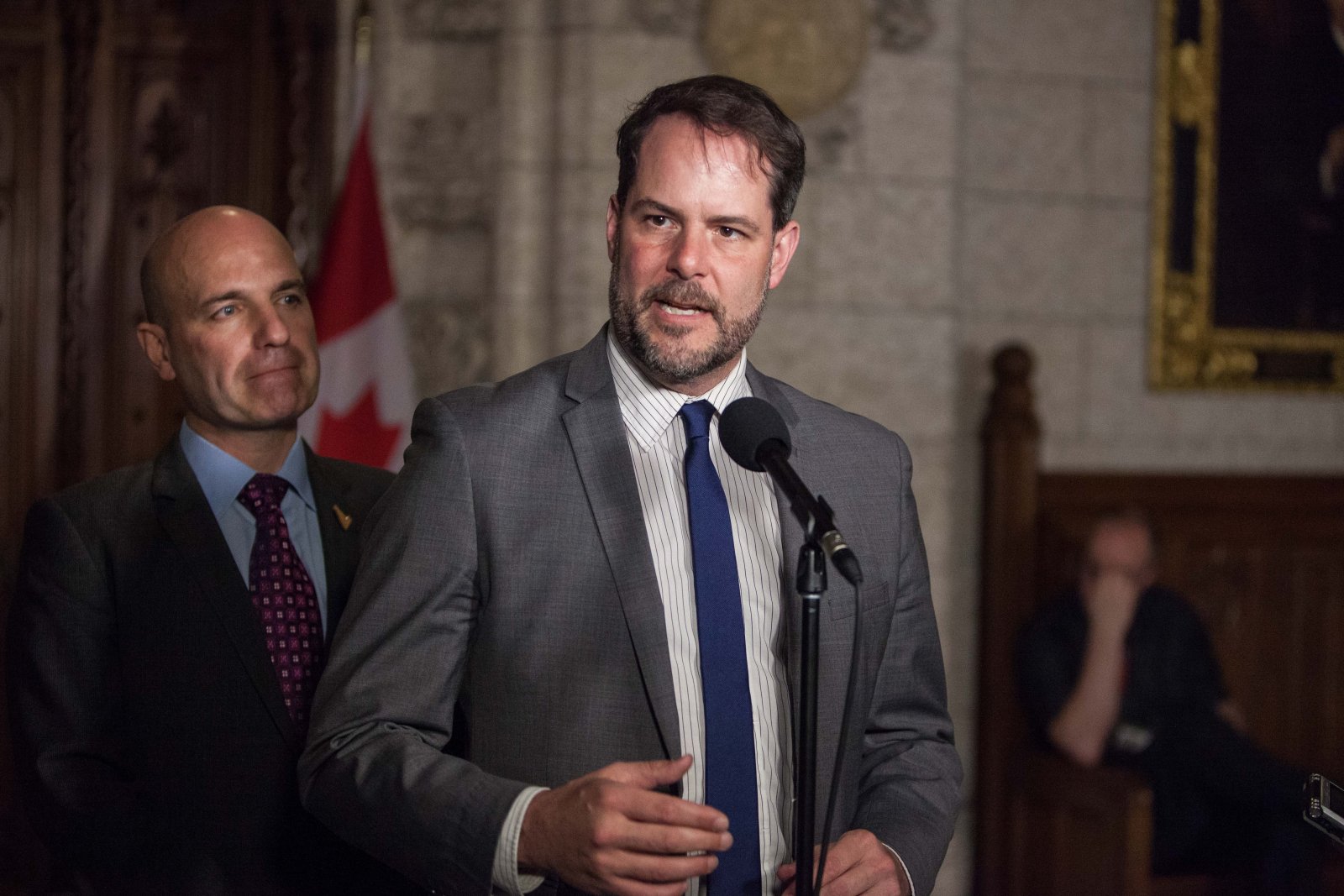Canada's pipeline regulator is getting pounded with complaints from Canadians who say it is withholding federal records, said a senior executive in a newly-released message that was sent to all staff.
During the first quarter of the 2017/2018 fiscal year, the National Energy Board (NEB) received 67 new complaints from Canadians about its responses to requests made through Canada's access to information legislation. This total is 400 per cent greater than all of the complaints it received over the previous year, said the message signed by NEB executive Sylvain Bédard.
"Over the last year the number and frequency of access to information (ATI) requests has increased drastically," Bédard wrote in the message dated Oct. 16, 2017 and released to National Observer through access to information legislation.
Bédard is executive vice-president of "transparency and strategic engagement" at the regulator, but he has been on leave since Nov. 6, 2017, a few weeks after he sent the message.
His comments also indicated that the NEB recorded an increase of 247 per cent in access to information requests from 2015/2016 to 2016/2017 and that requests for information from members of Parliament also increased by 130 per cent during the same period.
'Ripple effect' through NEB
The NEB was reviewing major pipeline proposals during these years such as Kinder Morgan's Trans Mountain expansion, TransCanada's Energy East project and Enbridge's Line 3 replacement project.
Transparency has been a key issue raised by critics who believe the NEB's reviews of these projects did not consider all available evidence. In the case of the Energy East project, recently terminated by TransCanada, hearings shut down following revelations that NEB chair and CEO Peter Watson and other senior officials had participated in a private meeting with a representative of the company, former Quebec premier Jean Charest.
Bédard told staff last October that the regulator was attempting to address the complaints about its secrecy.
"Our ATIP (access to information and privacy) team has been working tirelessly to move through the requests, it has not been easy," Bédard said in the October message. "I know this increased work has also created a ripple effect through the organization and I thank each of your individual efforts to respond in a timely manner to requests — it all makes a big difference."
Canada's Access to Information Act is a transparency law that requires federal organizations to release public records upon request within 30 days to any Canadian citizen who pays the $5.00 fee. The law allows the government to withhold records or delay its response if it has a valid reason for doing so.
While members of the public have the right to request federal records through access to information legislation, federal politicians can also compel government organizations such as the NEB to release information upon request by tabling their questions in Parliament. This parliamentary option triggers a process that normally gives a federal organization 45 days to respond.
National Observer is able to get some information about what the regulator is doing behind the scenes when it gets tips from sources or when it gets responses to access to information requests. It is often forced to do this since Watson, the NEB CEO, and most other senior officials at the regulator have denied most interview requests with National Observer for more than two years.
National Observer files complaints when the regulator seeks extensions on its responses and when it returns records that are censored. Under the law, each of these complaints automatically triggers an investigation by the federal information commissioner.
In one of those cases, National Observer asked the commissioner to investigate an incident in which a vice-president at the regulator had ordered staff to delete an email sent to the NEB's head of security, Lee Williams, in August 2015. The commissioner was also asked by National Observer to look into a case in which someone deleted a text message that the NEB's former chief operating officer, Josée Touchette, had sent to Bédard in June 2016 after he did a job interview for his current position.
National Observer asked the NEB if its executives had considered addressing the spike in complaints by making themselves more accessible for interviews and improving efforts to be transparent. A spokeswoman for the regulator said it would ask Watson if he was available for an interview.
Bédard began his job to promote "transparency" at the NEB in August 2016. One of his first major decisions was to recruit a private security firm to investigate sources of National Observer reports about NEB management mistakes. He later issued an apology to staff when the security firm submitted a report that failed to identify any sources, following a series of interviews and a search of employee emails and phone logs.
Touchette left her job last fall to accept an executive position with the Organisation for Economic Co-operation and Development in Paris, France. Williams has also taken a leave of absence from the NEB.

NEB denied having any breaches
In a separate case involving questions submitted by New Democratic Party MP Alexandre Boulerice in Parliament, the NEB denied that it had recorded any privacy breaches in 2015, despite at least two separate incidents, including one involving the deleted email that was sent to Williams. This email indicated that someone at the NEB had shared personal information of a federal employee with another private investigator.
The other incident involved NEB phone bills that were accidentally mailed by their service provider to the wrong address in January and February 2015.
While the NEB said it didn't report these cases in its response to Parliament because it didn't believe they were breaches, the office of the privacy commissioner told National Observer in an email last August that the phone bill incident involved "improper disclosure of personal information, therefore it was a breach." The federal watchdog, however, also decided it was not necessary to launch a full investigation into this matter after reviewing the circumstances of the misdirected phone bills.
When asked for his reaction, Boulerice said that the response from the NEB, submitted in Parliament by Natural Resources Minister Jim Carr, lacked rigour and transparency. He also said it raises questions about what else the regulator might be hiding.
"They are playing with words," Boulerice told National Observer in an interview. "It's like they didn't want to tell us the whole truth."
A spokeswoman for the New Democrats added that the Liberal government's recently-tabled legislation, Bill C-69, to create a new Canadian Energy Regulator, effectively "clones the NEB," but includes nothing to address transparency and access to information issues "that have been, and will continue to be problematic" within the agency.

NEB adds new staff
In response to the spike in requests and complaints, Bédard said in his October 2017 message to staff that he was trying to improve the regulator's transparency efforts through new guidelines and the hiring of four additional staff members to process requests.
"We each share in the responsibility to ensure a successful process by meeting request deadlines, responding to questions with accuracy, and making sure files are complete — providing transparent communications to Canadians," he wrote.
He also said that the NEB offered "refresher courses in information management" to staff, while analyzing whether the regulator "can better leverage technology to streamline the work we do."
"But we are not done," he continued in his message. "Over the coming months we will continue to build up the (access to information capacity) by hiring a Director... and assessing software solutions to deliver efficiencies in workflow and reporting. You'll also continue to see messages for training and awareness tips."
He also suggested that employees should feel free to contact the staff who are assigned to handle and process access to information requests.
"They are an invaluable resource to the organization," he wrote. "As always, if you have other questions, my door is open."
Soon after Bédard sent this message, Watson, the NEB CEO, sent a message to all staff indicating that Bédard would be taking a leave of absence, effective on Nov. 6, 2017.
"I recognize that there have been a number of changes in our executive team in the last few weeks," wrote Watson, the NEB CEO. "Thanks to the NEB's solid planning, and the depth of skill and experience in our workforce, I am confident that we are positioned to carry out the important work that we do on behalf of Canadians. I thank you for your understanding during these times of change, and for your hard work and dedication to the NEB. As always, your ongoing support is greatly appreciated."
The NEB has declined to say what prompted Bédard's leave.
Regardless of the NEB having
Regardless of the NEB having had numerous blatant examples of breaches of confidentiality / privacy thrown in their faces, and those affected landowners asking why, the NEB predictably provides their standard response - NONE.
NEB transparency - Oxymoronic.
A spokeswoman for the New
A spokeswoman for the New Democrats added that the Liberal government's recently-tabled legislation, Bill C-69, to create a new Canadian Energy Regulator, effectively "clones the NEB," but includes nothing to address transparency and access to information issues "that have been, and will continue to be problematic" within the agency.





Comments